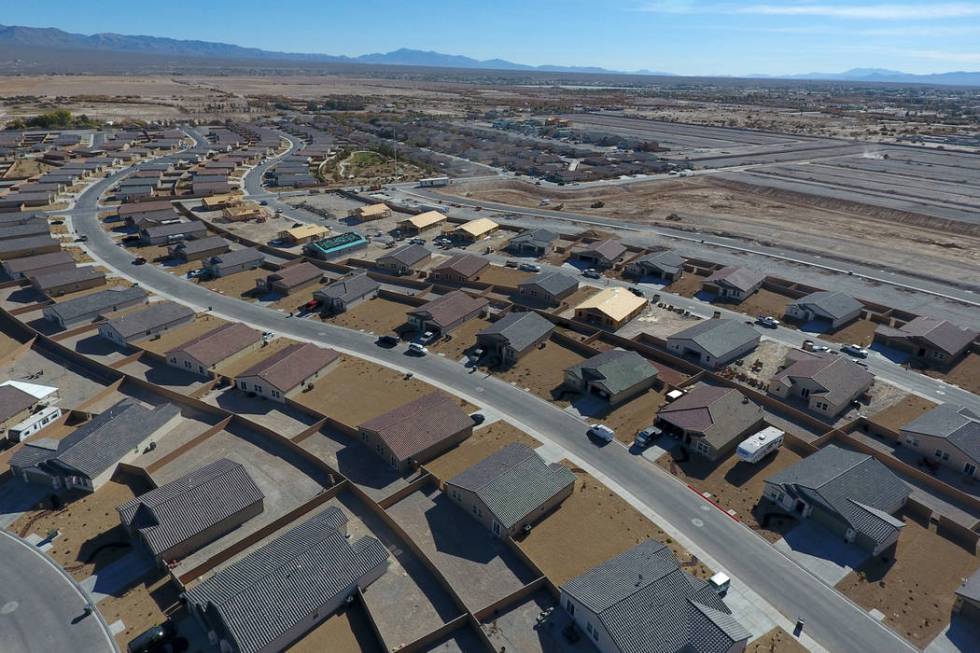Rural housing developments outside Las Vegas making a comeback

PAHRUMP
When homebuilder Russ Meads pulled the plug on Cottage Grove Estates during the recession, it became yet another ghost project haunting Southern Nevada.
Meads, owner of Double M Construction, had set out to build 141 houses in the Pahrump subdivision but only put up about two dozen by the time the market cratered.
He didn’t build any houses there for years, but with the economy in better shape, he now expects to build 27 in Cottage Grove this year and hopes to build 60 to 65 in 2019.
He’s not the only rural homebuilder ramping up work. Construction, sales and development plans are speeding up — in some cases rapidly — in towns an hour’s drive or more from Las Vegas.
The uptick comes amid fast-rising home prices in the Las Vegas Valley. Developers are betting the heated market will persuade buyers to look at rural outposts, which offer cheaper houses but also hefty commutes to Las Vegas and not as many jobs, services and amenities as their famous neighbor.
“I think it’s a matter of addressing affordability, giving people more house for less money, and it’s really hard to do that in Vegas,” said Robb Beville, Nevada division president of Century Communities, who is not building in the outlying towns.
The median sales price of previously owned single-family homes, the bulk of the market, was around $295,000 in October, up 12 percent year-over-year and more than double the market’s low point in early 2012, according to the Greater Las Vegas Association of Realtors.
This isn’t the first time that builders have ventured to remote communities outside America’s casino capital to sell less-expensive homes in suburban-style subdivisions. But the last big push, during the mid-2000s bubble, often involved massive plans with hundreds or thousands of homes in places such as Pahrump and northwest Arizona. It also ended badly, with many rural projects abandoned mid-construction or never leaving the drawing board.
Home Builders Research founder Dennis Smith said he doesn’t expect another wave of sprawling developments similar to what was seen in the boom years.
“I think they learned their lesson on that,” Smith said.
‘People are amazed’
The current volume of work in outlying areas is nowhere close to overtaking the Las Vegas Valley’s. But similar to Las Vegas, construction in these communities remains a fraction of its pre-recession peaks and has gained speed since the economy tanked.
In Pahrump, for instance, builders pulled more than 1,000 single-family residential permits in fiscal year 2005, then just 23 in 2010 and 405 in 2018, according to Nye County planning director Brett Waggoner. Out in Mesquite, builders pulled almost 600 new-home permits in 2005, 105 in 2009 and 329 last year, city records show.
A number of projects now underway in outlying areas were started during the housing boom but sat dormant for a while. Among them: Beazer Homes closed 92 sales in its Burson Ranch subdivision in Pahrump last year and 129 this year through October, after not selling any there for five years, according to Home Builders Research.
Once blighted with thickets of weeds and paved roads that abruptly ended, Burson Ranch is now an active construction site, and its streets are lined with houses.
“People are amazed,” Waggoner said of the activity.
Beazer’s Las Vegas division president, Steven Cervino, was unavailable to comment for this story, a spokeswoman said.
Lennar Corp., one of the biggest builders in America, is also getting in on the rural action. It lists two communities in Pahrump — Artesia and Pleasant Valley — on its website, saying online that “the world’s greatest playground is your backyard.”
A representative for Lennar did not respond to a request for comment.
‘A little depressing’
Other builders are venturing to even-smaller towns outside Las Vegas. D.R. Horton, also one of America’s biggest builders, bought dozens of lots in May in the mostly empty Valley Heights subdivision in Logandale. And in July, Touchstone Living, a small Las Vegas builder, acquired 40 lots in an unfinished project in Indian Springs.
Creech Air Force Base, a hub of military drone operations, is across the highway, but Indian Springs’ limited retail and services include small grocer Fay’s Country Store, a community center and a Chevron gas station.
Touchstone founder Tom McCormick said he is targeting people who are “tired of being renters and want to own” and would be willing to “put some miles” on their car in exchange for buying a house “at a remarkably low price.” He said 100 people have joined an interest list and that a few buyers signed sales contracts.
McCormick also said he wouldn’t have considered the project if land and home prices weren’t as high as they are in Las Vegas.
His prices in Indian Springs start at $238,000, Touchstone’s website shows. By comparison, builders’ median sales price in Southern Nevada was $375,190 in September, according to Home Builders Research.
“The only reason it makes any sense at all is because affordability has become so challenged,” McCormick said.
The increased activity in Las Vegas’ outlying towns doesn’t compare with the frenzy of the bubble years. Ultimately, many of those projects fizzled, including Pahrump’s Cottage Grove Estates. Meads, the developer, said he started the project in 2005, but buyers disappeared when the market tanked.
After he halted construction, it was “a little depressing to drive by and see what could have been,” he said.
Today, most of his buyers there are retirees. And while he’s “shocked” at Burson Ranch’s sales volume, he said Pahrump’s homebuilding market overall is not seeing rapid acceleration again.
“It’s strong, but it’s steady,” he said.
Contact Eli Segall at esegall@reviewjournal.com or 702-383-0342. Follow @eli_segall on Twitter.